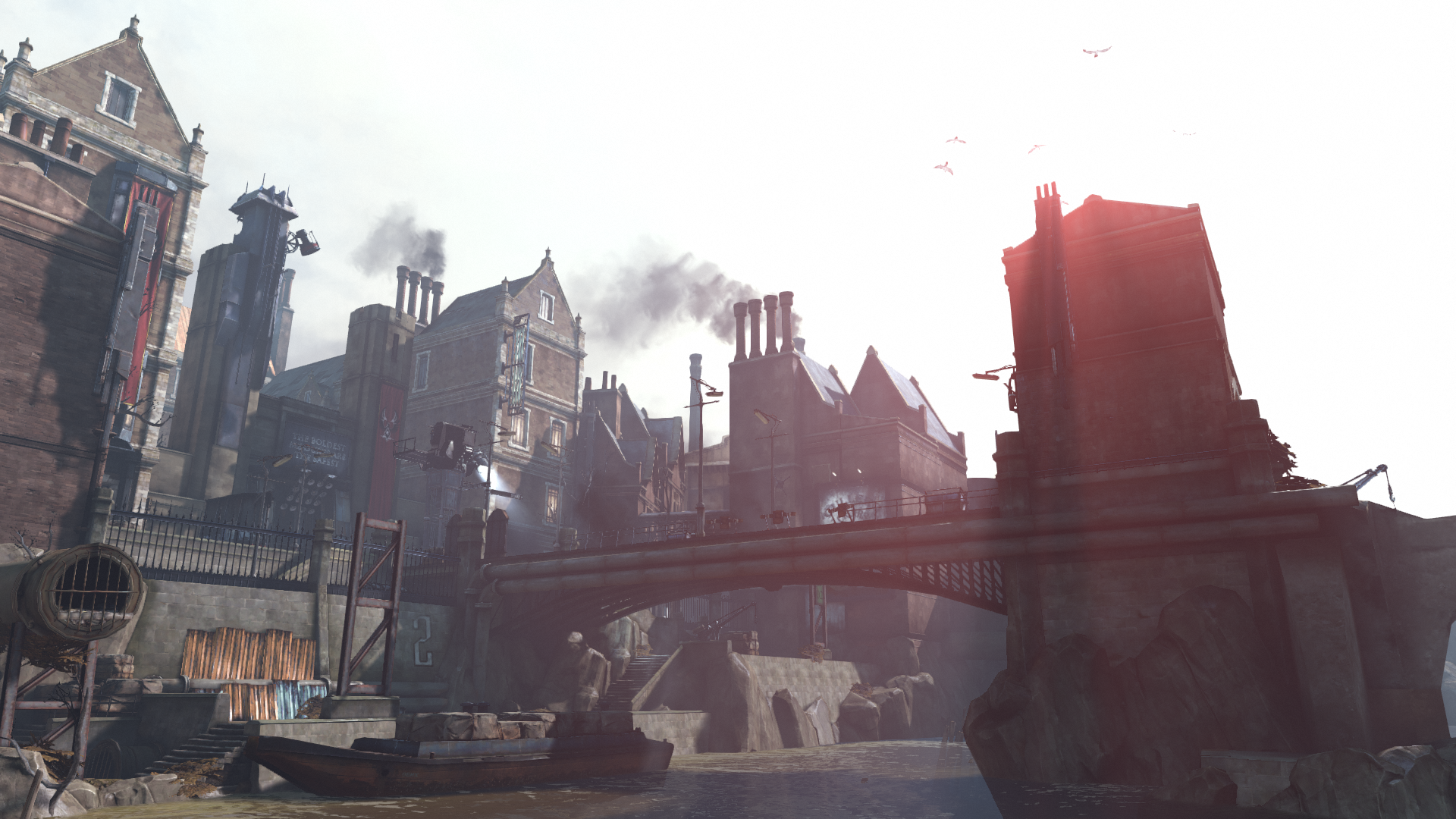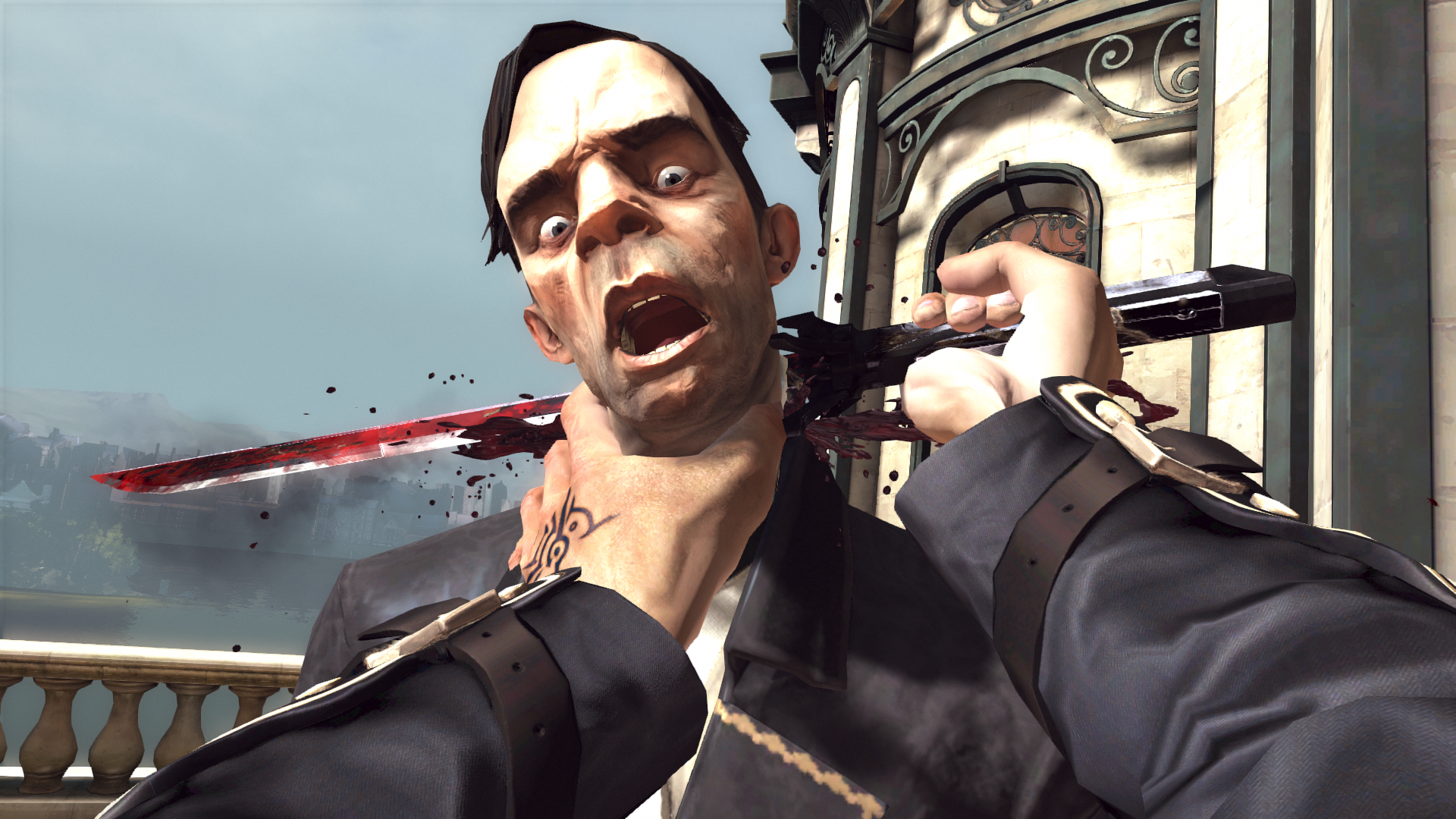Arkane Studios knows what they’re doing when it comes to first-person action titles. Back in 2002 they developed Arx Fatalis, a first-person action RPG title that took place in a large world, followed up by Dark Messiah of Might and Magic in 2006. In 2010 they assisted on Bioshock 2 and now they’re bringing the world of Dunwall in Dishonored to life.
In Dishonored, you play as Corvo Attano, the former bodyguard of The Empress of Dunwall. In the opening moments of the game (also on display at the bottom of this article,) Corvo is framed for her murder and the city is taken over by conspirators. You are tasked with seeking out your revenge on those that took your old life away, becoming a skilled and feared assassin. On this journey, you gain supernatural abilities and make choices throughout the game that shape the atmosphere around you, the attitude’s of the game’s characters and the fate of the world itself.

The previous paragraph is the type of thing you might see on the back of the game box, but like any game, it’s not really all 100% true. Sure, you get to pick whether or not you climb in the window or kick down the front door, but in the end, you’re still killing that one guy. The beauty of Dishonored isn’t in the overarching plot choices you make like in a Mass Effect game, it’s in the subtle choices that affect the atmosphere and characters around you.
Should you scale across the rooftops and quietly take out your target and incapacitate your enemies in order to safely move through the building, or simply go full-badass and murder all those that are foolish enough to be in the wrong place at the right time? All of these decisions directly contribute to the tone of the game. For example, if I leave a trail of dead bodies in my wake in every single mission, the game is going to feel a lot darker. Not only does it feel darker, the game will react to you as well. If you play more violently, guards and the like will take extra measures to ensure added security.
NPCs might not want to look you in the eyes when you speak with them, they will be afraid of you, guards will whisper and speak your name in fear while you lurk in the shadows around the corner. Even the “friendly” NPCs that are supposed to love and respect you will learn to fear what you become. Obviously, if you stealthily creep through each level, seldom killing anyone but the target, never being caught – your reputation will be quite different, especially to those NPCs that you interact with often.
As far as the plot itself goes, there is quite a bit left to be desired. The narrative is told very well and there are plenty of events and characters to keep you interested throughout the story. My central issue is twofold: 1) It feels a bit brief, clocking in at around 10-12 hours depending on speed and playstyle, and 2) It’s mostly straightforward without many twists (except for near the ending.)
With that being said, there is plenty of replay value given the different ways to complete missions, different tones the game can take, and the different endings. The wealth of gameplay options is where this game truly hits its mark. Essentially, it plays and feels like a fantastic mixture of Thief and Bioshock in both style and premise. Sticking to the shadows and sneaking around behind objects is 99% of the time the better option as opposed to slashing and shooting everyone in your path. That’s not to say that you can’t wage a full-frontal war, but it won’t be easy – especially in the beginning. Once you acquire new powers and get better at the fighting system, however, you can easily take on three or more enemies at once. This is one of the few games where as you get farther in the game, you start to really feel more powerful, as opposed to the game simply getting easier.
As you traverse the levels of Dishonored, you come across Bone Charms that provide you with passive bonuses, and you find Runes that are used to upgrade and develop new powers (such as Blink, which is essentially an extremely versatile teleporting ability.) In my first playthrough of the game, I took the violent approach. I zipped in and out of cover, slitting throats and often taking multiple enemies head-on. By the end of the game, I was using my gust power to throw enemies off of balconies, stopping time and killing entire rooms in one fell swoop, teleporting past groups of enemies, and so much more.
Combining powers to produce unique situations never gets old either. Should you take control of a guard and make him walk off the side of a building? Maybe you can set a trap, take control of him, then make him step on it? Maybe a guard is running full-speed at you, instead of standing toe-to-toe you teleport behind him and slit his throat while he stands confused. Scenarios like this are constantly springing up organically in the game world. Experimenting with powers is what makes the game as unique as it can be – your imagination is the only limitation.
The world of Dunwall is beautifully realized as each mission area has a distinct feel to it whether it be the policed streets outside of a manor or the dank sewers roaming with zombie-like Weepers. Once you get up close to the environment, however, textures often look blurry or sloppy in some places. The art style, from afar, is absolutely beautiful. As you ride into each mission area on Samuel’s boat, the vistas are breathtaking. However, you will seldom come across anything worth note outside of the distant landscapes as far as the visuals are concerned. It feels like they took a safe approach, employing an exaggerated realism which definitely contributes well to the atmosphere of the game, but also fails to push any boundaries forward in my opinion.
Remember the creepy music from the debut gameplay trailer a few months ago that sounded like it was being sung by a creepy children’s choir? If not, you’ll remember it soon – many of the guards in the game you’ll find whistling the tune to that very song as they slowly patrol lonely corridors. It doesn’t get a whole lot creepier than sneaking up on someone, hearing that tune, then immediately remembering the chilling children’s choir from the trailers. The rest of the soundtrack in the game is mostly atmospheric sounds, but they’re placed perfectly to complement the tone of the rest of the game.

Dishonored doesn’t really do anything overly ambitious or revolutionary – basically all of the elements in this game you’ve seen before, but seldom will you see a game like this that is also crafted so expertly. From the chilling atmosphere to the intense free-form gameplay and mission progression, you can bet money that each person’s experience with this game will vary wildly. Modding abilities and/or quality DLC releases could go a long way to extending the fun and longevity of a game like this. A lot of people will probably rent it for the weekend or play it at a friend’s house, which really is a shame for the amount of genuine entertainment there is to be had.
By the end of the game you could be a soul-less and violent assassin drenched in the blood of your enemies, or a shadow in the night that no one is even sure whether or not you exist, but one thing is certain – the sweet taste of revenge often solves everything.
Dishonored releases for the Xbox 360, PS3 and PC in North America on October 9th, and in Europe on the 12th. Let us know what you think of the game and this review in the comments below!
If you’re interested, I’ve uploaded the first mission (after the opening) split into Part 1 and Part 2. Be sure to check them out!
This review was based on a review download copy of the game for the PC provided by Bethesda.
Discover more from The Koalition
Subscribe to get the latest posts sent to your email.


